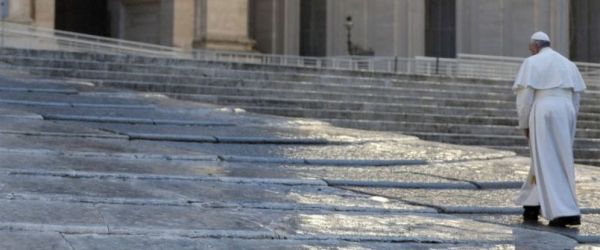Transmitted not to convince but to offer a Treasure
The Gospel of Mark was the first to be written. It is simple, a simple style, very close […] In the Gospel we have just read - which is at the end of the Gospel of Mark - there is the sending forth by the Lord. The Lord reveals Himself as Saviour, as the only Son of God; He revealed Himself to all Israel, all the people, especially and with more details to the apostles, to the disciples. This is the Lord’s farewell, the Lord is going away: He left and “He was taken up into heaven: there at the right hand of God He took His place (Mk 16:19). But before leaving, when He appeared to the eleven, He said to them: “Go into the whole world; proclaim the Good News to every creature” (Mk 16:15). This is the missionary dimension of faith. Either faith has a missionary dimension, or it is not faith. Faith is not something only for myself, so that I may grow with faith: this is a gnostic heresy. Faith always leads you to come out of yourself, to go out. The transmission of faith; faith must be transmitted, it must be offered, above all by witness: “Go, so that the people see how you live” (see v. 15).
Someone once said to me, a European priest, from a European city: “There is a lot of unbelief, a lot of gnosticism in our city. Because the Christians do not have faith. If they had it they would certainly give it to the people”. They lack this missionary dimension, because conviction is lacking at its root: “Yes, I am Christian, I am Catholic”, as if it were a social habit. On your identity card, your name is this and that, and “I am Christian”. It is a piece of information on an identity card. This is not faith! This is a cultural thing. Faith necessarily takes you out, it leads you to give it, because essentially faith must be transmitted. It is not something quiet. “Oh, so you mean, Father, that we all need to be missionaries and go to far-off countries?” No, this is a part of the missionary dimension. This means that if you have faith you must by necessity come out of yourself, and show your faith in society. Faith is social, it is for everyone. “Go into the whole world; proclaim the Good News to every creature” (Mk 16:15). This does not mean becoming someone who proselytises, as if you were recruiting people to a football team or to a non-profit organisation. It means that you show the revelation, so that the Holy Spirit might work in people through witness: as a witness, with service. Service is a way of life. If I say that I am a Christian, but I live like a pagan, that doesn’t work, that doesn’t convince anyone. If I say that I am a Christian, and I live like a Christian, this attracts. It is witness.
Once, in Poland, a university student asked me: “At university I have many atheist companions. What should I say to them to convince them?” “Nothing. The last thing you need to do is say something. Start to live, and they, seeing your witness, will ask you, ‘Why do you live this way?’”. Faith must be transmitted: not by convincing but by offering a treasure. “It is there, do you see it?” And this is also the humility Saint Peter spoke about in the First Reading: “Wrap yourselves in humility to be servants of each other, because God refuses the proud and will always favour the humble” (1 Pt 5:5). How many times in the history of the Church have movements and aggregations been born, of men and women who wanted to convince others, to convert them… True proselytes. And how did they end? In corruption.
This passage of the Gospel is so tender! But where is the certainty? How can we be sure that by going out of ourselves we will be fruitful in the transmission of the faith? “Proclaim the Good News to every creature” (Mk 16:15) and you will work wonders (see vv. 17-18). And the Lord will be with us until the end of the world. In the transmission of ideologies there are teachers but when I act out of faith, the Lord accompanies me. I am never alone in the transmission of faith. It is the Lord with me Who transmits faith. He promised: “I will be with you all days even till the end of the world” (see Mt 28:20).
Let us pray to the Lord that He help us to live our faith in this way: a faith with open doors, a transparent faith, not proselytism, but which shows itself: “I am this way”. And with this healthy curiosity, may He help others to receive this message that will save them.
[Pope Francis, St Martha's homily 25 April 2020]












